2006 Jeonju International Film Festival Report
by Davide Cazzaro
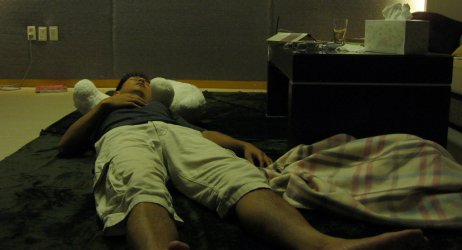
Don't Look Back, dir. Kim Young-nam
Davide Cazzaro: Observations and notes on the 7th JIFF
Impressions
I confess that I was particularly glad to come back to Jeonju and attend the festival. The experience I had in 2004 was very positive, but the organizers appointed the year before were still redefining some aspects of the event and further ameliorations were necessary (especially in logistics). By 2006 the festival had most of the theatres located in the central cinema district, and it was wisely decided to reduce the number of films in order to focus on special events such as lesson-debates, seminars, tributes and discoveries. JIFF's main goal is clearly expressed by co-programmer Yoo Un-seong: to enrich cinephilia in Korea. Certainly not an easy task nowadays, since Korean cinephilia is declining after being linked to a period of
![]() cultural and political protest.
cultural and political protest.
This year's logo ";}{;' was particularly interesting because it used the smileys -- a collective heritage of the electronic community -- to underline both the festival's attention to the digital era and its images, and the importance of the meetings and debates proposed every year.
Numbers
9 days of screenings (April 27-May 5); 194 works (short, medium and feature films), almost 100 less than two years ago, from 42 countries; 14 theatres (included a small outdoor venue); JIFF's most successful year ever in terms of audience (10,000 more paying viewers than in 2005).
Films
The program was divided into many different sections, evidence that on the one hand the festival insists on lesser known cinema (or at least films that can't find any room in the local exhibition market), and on the other hand it allows some exceptions to these selection criteria, inviting some films with more commercial characteristics.
The main parts of the program are the two international competitions Indie Vision and Digital Spectrum (dedicated respectively to first and second features by independent filmmakers and to works shot in digital formats), the retrospectives, and space for Korean and experimental cinema.
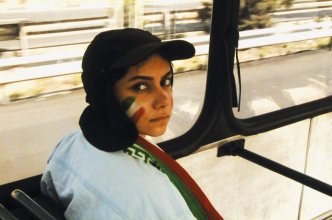 This year's opening film was the impressive Offside, by famous Iranian director Jafar Panahi, which recently won the Silver Bear at the Berlin Film Festival, while the ambitious debut by Kim Young-nam, Don't Look Back, served as closing film. This latter work deals with young generations in contemporary Korea. The director chose very good actors to portray three different sad stories of daily life and demonstrated strong trust in naked cinema (few changes in the shot scale, long periods of silence, no interest in camera movements). It is a pity that, as a whole, the movie ends up a little bit too long (126 minutes) and too flat.
This year's opening film was the impressive Offside, by famous Iranian director Jafar Panahi, which recently won the Silver Bear at the Berlin Film Festival, while the ambitious debut by Kim Young-nam, Don't Look Back, served as closing film. This latter work deals with young generations in contemporary Korea. The director chose very good actors to portray three different sad stories of daily life and demonstrated strong trust in naked cinema (few changes in the shot scale, long periods of silence, no interest in camera movements). It is a pity that, as a whole, the movie ends up a little bit too long (126 minutes) and too flat.
Since JIFF has always tried to take stock of Korean indie production, more than one section was dedicated to the national cinema. This year, unfortunately, I was quite disappointed by some works, especially feature films. Certainly no two films can represent a general tendency, but the awkward direction, redundancies, and farraginous ideas of Oh! My Sweetheart! by Park Ji-won and, most of all, of Throw the Cross Away by Oh Joum-kyun made me worry. Even with some reservations, I can say that the most interesting Korean features were Heavenly Path by Kim Eung-su and Between by Lee Chang-jae, both shot in HD and able to tread the feeble line that divides fiction from nonfiction. The former, meaningfully played by the director himself, deals with a travel to the Himalayas that becomes an intimate path (an homage to Gus Van Sant's Gerry, according to the director of photography). The latter deals with Korean shamanism, more particularly with the activities of shaman Lee Hye-kyung, and it could be fully inscribed in the so-called observational (or participatory) documentarism in which, thanks to portable and flexible equipment, allows those who film to "participate" on the inside of the event, engaging the audience.
Korea aside, among this year's Asian selection (marked by the strange absence of China) I would like to mention Heart, Beating in the Dark by Nagasaki Shunichi (Japan), who was one of the filmmakers in focus at the latest Rotterdam Film Festival. The director dealt with his own homonymous indie feature shot on Super 8 in 1982 as it was a text to "deconstruct" and rethink critically. The plot remains the same -- a young couple runs away after killing their child -- but the narration is fragmented by parts of the original film, by a story that involves the origial actors who starred in 1982, and by images from the shooting of this atypical "new version", creating an impressive architecture of cross references, repetitions and variations.
Digital Short Films by Three Filmmakers
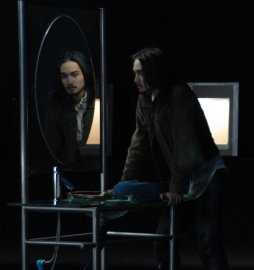 JIFF could not have established itself so quickly without the Digital Short Films by Three Filmmakers, an original and prestigious program started from the very beginning of the festival. This year, Darezhan Omirbayev (Kazakhstan), Eric Khoo (Singapore) and Pen-ek Ratanaruang (Thailand) accepted the festival's invitation, extending the map of the countries that have taken part in this project. Even if, unfortunately, none of these directors used the digital medium to challenge the traditional film aesthetic, I was impressed by the remarkable work by Ratanaruang, Twelve Twenty (pictured right). This short -- freely taken from Gabriel García Márquez's four-page short story Sleeping Beauty and the Airplane and framed between two specular shots -- is almost entirely set in the first class cabin of an intercontinental flight (the title refers to the length of the trip in hours and minutes). The aircraft, a place of transit for antonomasia, becomes a dreamlike space (the set and Christopher Doyle's touch confirm this) and the story of a passenger who develops a love at first sight for the woman sitting in the seat next to him can be read as a meditation on people's sentiments and on the difficulty of being on the same wave-length as others.
JIFF could not have established itself so quickly without the Digital Short Films by Three Filmmakers, an original and prestigious program started from the very beginning of the festival. This year, Darezhan Omirbayev (Kazakhstan), Eric Khoo (Singapore) and Pen-ek Ratanaruang (Thailand) accepted the festival's invitation, extending the map of the countries that have taken part in this project. Even if, unfortunately, none of these directors used the digital medium to challenge the traditional film aesthetic, I was impressed by the remarkable work by Ratanaruang, Twelve Twenty (pictured right). This short -- freely taken from Gabriel García Márquez's four-page short story Sleeping Beauty and the Airplane and framed between two specular shots -- is almost entirely set in the first class cabin of an intercontinental flight (the title refers to the length of the trip in hours and minutes). The aircraft, a place of transit for antonomasia, becomes a dreamlike space (the set and Christopher Doyle's touch confirm this) and the story of a passenger who develops a love at first sight for the woman sitting in the seat next to him can be read as a meditation on people's sentiments and on the difficulty of being on the same wave-length as others.
Retrospectives and events
This year's international retrospectives were extremely valuable. They focused, respectively, on one of the most important authors in the history of Indian cinema, Ritwik Ghatak (1925-1976), on a "secret history" of Soviet cinema between the 60's and 80's, and on the discovery of some Korean filmmakers who worked in Japan in the first half of the past century (because of this they were neglected in Korean cinema history). This later program represented another chance to increase cultural exchanges between Korea and Japan, putting aside the frequent ups and downs of diplomatic relations.
Among the highest and strongest moments of JIFF 2006 I include the lectures given by Peter Tscherkassky (a key figure in the so-called third generation of Austrian experimental cinema), the screening of the famous A Page of Madness (Kinugasa Teinosuke, 1926) accompanied by a live performance of modern music by Korean musician Monla, and the crowded actor's masterclass given by no less than Choi Min-shik.
Future
This young festival is getting better and better and it plays an important role in support of the national cinephile culture, keeping alive a meditation on cinema. With its relaxed setting, its numerous foreign guests, its cinephilic rituals, its prestigious retrospectives and the crowds of young people who rush even to screenings of difficult films, JIFF has undoubtedly become an oasis of artistic culture and an important cultural event of the Far East. The future? At the moment... no clouds on the horizon.
An Interview with Jung Soo-wan and Yoo Un-seong
by Davide Cazzaro
During the 7th Jeonju International Film Festival (JIFF) I had a chance to meet Jung Soo-wan (on the left in the picture below) and Yoo Un-seong (right), who are responsible for the festival's programming. Jung has a degree in film studies and has collaborated with the Women's Film Festival in Seoul. She has been working for JIFF since the first edition; in 2003 she became programmer. She's currently teaching film theory at Dongguk University. Yoo is a film critic who contributes to various film magazines. From 2002 to 2004 he worked for the Korean Shorts Critic's Week section at JIFF, and then one year later he became programmer. The conversation we had was an occasion to discuss the festival and Korean cinema.
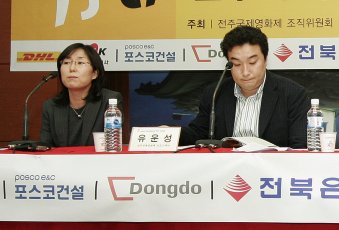 I'd like to begin by talking about the festival and how it has changed over the years...
I'd like to begin by talking about the festival and how it has changed over the years...
JSW: There have been some changes in the organization, especially in people -- the directors and the programmers -- but I think there has been no change in the concept of the festival, from the first edition until now. There has always been a focus on independent, arthouse, minor and experimental films from all over the world.
What could you say about the relationship between the festival and the city of Jeonju?
JSW: JIFF is closely related to Jeonju, which has been a great city for filmmaking since the 1950s. Furthermore, the city has always had a keen interest in the arts, including cinema. In recent years the local government has tried to promote the image of the city by focusing on this interest. In 2000 cinema was the most popular medium, so they decided to organize a film festival.
Could you comment on the festival slogan "Freedom, Independence, Communication", when it was born?
JSW: At the beginning the slogan was "Alternative, Independent, Digital", but the concept of "Alternative" is very difficult to understand for the Korean audience...
YUS: We also have to rethink the digital medium from now on, because the situation is changing very rapidly...
JSW: So in 2003 we slightly changed the slogan into an "easier" one.
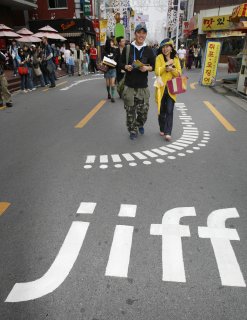 In general, what are the main goals of JIFF?
In general, what are the main goals of JIFF?
JSW: I think the ultimate goal for JIFF is to have bigger audiences who can enjoy various films. We'd like to introduce more and more independent and experimental works. In order to do that we're trying to organize some special events related to these films such as lectures, masterclasses and meetings with directors and other guests.
YUS: We want to enrich cinephilia in Korea, so we hope that someday JIFF will become the most important event for Korean cinephiles.
Since the festival has always paid particular attention to digital filmmaking, I'd like to know what is digital for you and why digital?
JSW: We have always tried to get the meaning of the digital medium, because everyone can access it and it has become the new established medium of the 21st century.
YUS: A few years ago digital showed the illusion of creating democratic possibilities between the production and consumption of films. But I think it is still an illusion. In a sense, digital itself can't be considered innovative anymore but it is a tool for creative works. That's why this year we only selected very daring and creative works for our section Digital Spectrum. Frankly speaking, some of the films in last year's selection were simply digitally shot...
What could you say about the famous program by JIFF, Digital Short Films by Three Filmmakers?
JSW: I think we were the first festival in the world to start this kind of program. We don't have any special criteria or model that we follow while preparing it. We just try to select talented directors who have a bright future and it is not a problem if they have never shot on digital.
YUS: We never give the directors any theme and we don't interfere in any way. Next August the Locarno Film Festival will have a complete retrospective of the Digital Short Films by Three Filmmakers.
Do you think there is something in JIFF's organization and programming that should be improved?
JSW: I think we need more theatres since there are many sold out screenings. In this regard we were very surprised that last year and this year screenings of experimental short films were sold out. This gave us the strength to pursue more in this direction. We're also working to provide English translations for all our events and not only for the main ones but, as you can imagine, it depends on the festival budget.
YUS: As regards experimental works, I have to say that the feature films are still not so popular. They're not yet well known in Korea. This year we introduced an experimental feature by James Benning and another one by Jon Jost but these screenings were not very successful.
Could you briefly talk about this year's two competitive sections, Indie Vision and Digital Spectrum?
YUS: For a long-term view we're trying to find some promising debut filmmakers both for Indie Vision and Digital Spectrum. Not only from Asia but from all around the world. For this year's Digital Spectrum we have more debut filmmakers. I hope someday this section will represent one of the best showcases of worldwide cinema.
What are your favourite Korean and Asian films from this edition?
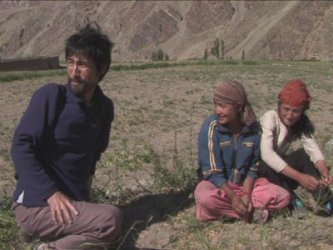 JSW: My favourite Korean films are Heavenly Path by Kim Eung-su (pictured right) and Between by Lee Chang-jae, both shot in HD. As for Asian films, Nuages d'Hier by Tsubokawa Takushi (Japan), The Art of Flirting by Kan Lume (Singapore) and John&Jane by Ashim Ahluwalia (India).
JSW: My favourite Korean films are Heavenly Path by Kim Eung-su (pictured right) and Between by Lee Chang-jae, both shot in HD. As for Asian films, Nuages d'Hier by Tsubokawa Takushi (Japan), The Art of Flirting by Kan Lume (Singapore) and John&Jane by Ashim Ahluwalia (India).
YUS: As for me, the Korean movie I appreciate the most is Heavenly Path by Kim Eung-su because I think that with this work the director is restarting his career, coming back to his roots. I was disappointed by his two commercial works, Desire and Way to Go, Rose, because I think that commercial projects don't fit his sensibility. The cinematographer of Heavenly Path, Bak Ki-ung, said that the film is an homage to Gus Van Sant's Gerry. I don't fully agree with him but I believe that the movie is a turning point in Kim Eung-su's career.
JSW: Talking about the two Korean movies I particularly liked, Heavenly Path is fiction but it looks like a documentary, so my emotional reaction was similar to that of a documentary. On the contrary, even if Between is a documentary it works also as fiction. In a sense, they blur the boundary between fiction and non-fiction.
Some people say that today there are too many film festivals in South Korea... what is your opinion in this regard?
JSW: I think we need more film festivals, of course not big-scale events but small-scale... I think festivals are very good places to raise the audience's interest in good films.
YUS: The problem is that most film festivals want to enlarge their scale.
JSW: Taking JIFF as an example, we want to make it smaller, reducing the number of films to about 100, in order to increase the film-related events I was talking about before. Basically there is a need for balance among film festivals and I hope that every festival will have its own characteristics.
What could you say about current digital and independent Korean productions?
YUS: Many independent works are produced every year but not many find distribution in theatres, and even if they are distributed, the box office results are poor. That's also why at JIFF we have always tried to show and promote minor and independent films.
JSW: The production condition for independent films is not good and the distribution condition is even worse. In the past, independent films were almost all about political and social issues. Nowadays the filmmakers are trying to see themselves through the camera. Since 2002 JIFF has published every year a little volume about Korean shorts at the festival, analyzing the trends and the themes. Unfortunately it is only in Korean language.
Finally, I'd like to ask you what's your opinion about the Screen Quota reduction recently decided by the government?
JSW: I agree that the Screen Quota has helped the growth of the Korean film industry but I think we need to increase the variety of films shown in Korea. I don't agree with the reduction, but my hope is to have a quota not only for Korean commercial films. Even with the Screen Quota we have an unbalanced exhibition market.
YUS: I think there is the need for a kind of Art Screen Quota System in order to show also arthouse films.
JEONJU May 2, 2006
(Photos and stills courtesy of JIFF's press service)